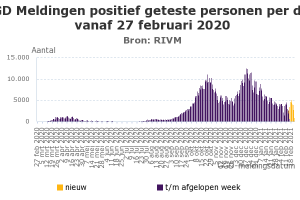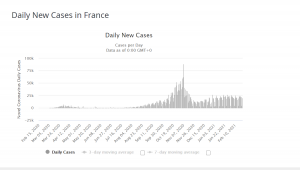In the last 22 months we have seen the complete and utter destruction of Gaza, with many powerful nations, companies and NGOs complicit in the crimes of Israel. This article intends to be an overview of the crimes committed by Israel, the scope of international complicity and some suggestions on what might be the next steps in showing solidarity with Palestinians.
Extent of the genocide
Destruction of human life
Between the start of the genocide in October 2023 and January 2025, Israel has killed at least more than 75.000 Gazans. [1] This doesn’t include those who died by starvation or preventable diseases caused by Israel’s cruel blockade of provisions, and it doesn’t account for the many people killed since. Israel has destroyed incredible amounts of Gaza’s infrastructure, including mosques, hospitals, all of its universities, and churches. It has forcibly displaced those who still survive these brutal onslaughts, planning to coerce them into what amounts to concentration camps. [2]
Many of those killed have been children. According to a UNICEF press release from May, over 50.000 of children are dead because of Israeli atrocities, or have become permanently disabled. [3] Scarred with burn wounds, without one or more limbs, or permanently damaged (if not killed) by the deliberate deprivation of important resources like food or medicine, the children of Gaza have become victim to one of the largest atrocities against children in modern history.
Urbicide
The destruction of churches, educational facilities, mosques and the general annihilation of Gazan infrastructure fits well into the scholarly concept of urbicide: the intentional destruction of cities and other urban places of residency to obliterate its history and to maliciously disrupt the social fabric. This is what we see when Israel bombs mosques, hospitals and universities under the tired excuse of it being “a hiding spot for Hamas”. Because besides massacring unimaginable numbers of people, the best way to erase them from history is to remove those institutions that reproduce and preserve their culture, that keep the identity of the Palestinians alive.
In an article for TRT world Dr. Fatina Abreek Zubiedat (assistent professor at Tel Aviv University Azrieli School of Architecture) says that “Israel intends to reduce Gaza into an ahistorical entity, “something present outside modernity and global experience”. [4]
Not to mention those facilities necessary to provide the first step towards healing the community, such as those structures that enable access to water, medical facilities, and ofcourse, the countless homes irretrievably destroyed or damaged.
Administrative detention
“Administrative detention”, Orwellian Newspeak for being detained without any judicial process or proof, has also been used to systematically terrorise Palestinians. A B’tselem report concluded that torture and sexual violence were structurally used to brutalise and torment Palestinians who had been imprisoned since October 2023. [5] Some things mentioned in the report include:
- Depriving inmates of vital medication and using harsh punishments that don’t take their health into consideration;
- Systematic use of severe beatings on inmates and denying them medical assistance when it caused serious injuries;
- Rituals of violent humiliation and debasement that include forced removal of clothes;
- Use of sexual assault as torture, including but not limited to penetration with objects and harming the genitals as part of interrogation.
Experts from the UN say this is regularly done as official policy and given as official and explicit orders by generals. [6]
Israel has done this willingly. It has willingly demonised Palestinian into a monolith of terrorists so that it can discard any notion of their humanity. It has willingly turned Palestinians into being ontologically evil, so that it can justify this genocide. And it has willingly executed a massive campaign of destruction and deprivation that has massacred a population that it was always oppressing.
International Complicity
The complicity of countries, companies and NGOs with this genocide has been widespread, persistent, and without shame. Both Western countries as the governments of many Arab countries, as well as the multitude of multinationals have taken barely any step to put pressure on Israel. Only countries like Bolivia, South Africa and Colombia seem to have taken real tangible steps to actually hold Israel somewhat accountable [7], while the vast majority of the “international community” has continued to provide military aid to Israel, and has done nothing to put economic pressure on the fascist apartheid State.
Imperialist Geopolitics
It is well known that the Israeli State is an important ally of European and North American nations.
The USA in particular sees Israel as a vital asset in insuring its own imperial agenda in the region, with its powerful intelligence and military apparatus. [8] Both in “countering the influence of Iran” and in the “War On Terror”, the USA has seen Israel as vital in securing its interests and dominance.
Aside from this strategic importance, Israel is also religiously and culturally important in the eschatology of Evangelical Christians, and in the general experience of many Jews.
The rhetorical use of democracy is of course very prominent in rationalisations of this imperialism.
The USA justifies its imperialist wars by saying “it’s spreading democracy” and Israel brands itself as “the only democracy in the Middle East”.
European countries happily participate in this framing, continuing to use it even in the face of pressure of sanctioning Israel. [9]
I’d argue this fits within a general pattern of Western imperialism, the implicit idea of united Judeo-Christian civilised societies fighting against the “backwardness” of the Islamic world. The references to human rights and democracy are largely obfuscations of this.
Accumulation By Dispossession
Beyond the many programs of overt military support provided mainly by countries like the US and Germany*[10], the Israeli economy has become an integral part of global capitalism. The material interests in Israeli colonialism and violence covers a vast array of household names, ranging from soda companies like the Coca Cola corporation and PepsiCo to the tourist industry, tech giants and clothing brands. Despite the persistent pressure of activists and boycott campaigns, the Western world relies uninterrupted on the violent marginalisation of Palestinians, and the exploitation of their stolen lands. This is of course a crucial reason, aside from cynical geopolitical reasons, for the continued complicity with the genocide.
Our economies depend on the continual theft and exploitation of resources of marginalised peoples, including, but definitely not limited to, Palestinians.
A very important concept related to this is “accumulation of dispossession”. This is a concept conceived by the scholar David Harvey as a remodeling of primitive accumulation as proposed by Karl Marx.
David Harvey said in his book The New Imperialism:
Access to cheaper inputs is, therefore, just as important as access to widening markets in keeping profitable opportunities open. The implication is that non-capitalist territories should be forced open not only to trade (which could be helpful) but also to permit capital to invest in profitable ventures using cheaper labour power, raw materials, low-cost land, and the like. The general thrust of any capitalist logic of power is not that territories should be held back from capitalist development, but that they should be continuously opened up.
From the beginning of the Zionist venture, onto the Nakba and beyond, this has been an extremely important dynamic within Occupied Palestine**. From Labour Zionism trying to force Israeli industrialists to only employ Zionist Jews at the cost of Palestinian natives to the 2011 Israeli protest against the local housing crisis ending up displacing more Palestinians for new homes [11], dispossession is an integral part of the Israeli economy. Another good example is that of the aforementioned Coca Cola operating a factory in an illegal settlement in the West Bank [12], and the overall abuse of Palestinian labor for Israeli benefit [13].
Thoughts On Solidarity
Without denying or minimizing the incredible work Palestinians and their allies have done over the world to hold Israel and their imperialist cronies accountable, I think there are a few things that need to happen more. I think the main thing is is that we need to involve more people outside of demonstrations and other more charged and confrontational events into awareness over Palestine and low bar solidarity with them. I think one of the things we can do is that we can make a booklet about the priority targets of BDS where we create an overview of why these targets are chosen, how to boycott them and suggestions into finding alternatives. I think its important to explicitly only focus on the targets of BDS because then it’s relatively easy to persuade people into actually doing the boycott and therefore it’s also easier to hold those people accountable. It’s also a good idea to organise more community events where we talk about Palestine, maybe with some lectures and nice food.
At the same time I also think we need to escalate. There need to be more disruptive actions that really cause economic harm or that at least consist of such persistent nuisance that there is a real sense of pressure. I am of course fully aware how much this demands of people who are already spread thin by their tireless effort or who aren’t privileged enough to face the severe consequences that will inevitably follow. Maybe spending more time on informal gatherings for dedicated and trusted activists, along with more organised divisions of labour in dealing with state repression can be part of the strategy.
Conclusion
I want to conclude this article by honoring those people whose lives are lost or damaged by Israeli state terrorism, and to commemorate the many people who’ve confronted the violence of Israel and given their lives to fighting the Zionist entity. I also want to share my deep respect for the activists who have put so many of their time, energy and safety into fighting this horrifying injustice, many of whom have done far more than I ever have.
Notes:
* This month, Germany announced it has suspended military aid to Israel. [14] Not because of humanitarian reasons of course, but because of pressure and the fear of losing face.
Unfortunately, many Germans still seem to be more concerned with the fate of the hostages than with the ordeals of the Palestinians.
**This is meant as the whole of Palestine, including Israel.
Sources:
[1] Middle East Monitor: Gaza Death Toll Reaches 84.000, Far Higher Than Official Counts, Study Finds. (mentioned 75.000 in the article because that is what they estimate as the minimum death toll as the result of military action)
https://www.middleeastmonitor.com/20250625-gaza-death-toll-reaches-84000-far-higher-than-official-counts-new-study-finds/
[2] Al Jazeera: Israel Presses Ahead With Gaza ‘Concentration Camp’ Plans Despite Criticism
https://www.aljazeera.com/news/2025/7/16/israel-presses-ahead-gaza-concentration-camp-plans-despite-criticism
[3] UNICEF: ‘Unimaginable horrors’: more than 50,000 children reportedly killed or injured in the Gaza Strip (press release)
https://www.unicef.org/press-releases/unimaginable-horrors-more-50000-children-reportedly-killed-or-injured-gaza-strip
[4] TRT Global: ‘Urbicide’: Erasing Palestinian Memory Beyond Gaza’s Ruins
https://trt.global/world/article/17809785
[5] B’Tselem: Welcome To Hell: The Israeli Prison As A Network Of Torture Camps
https://www.btselem.org/publications/202408_welcome_to_hell
[6] BBC: UN Experts Accuse Israel Of Sexual Violence And ‘Genocidal Acts’ In Gaza
https://www.bbc.com/news/articles/clyr154314vo
[7] Africa News: 12 Countries Adopt Measures To Pressure Israel To End Military Action In Gaza
https://www.africanews.com/2025/07/17/12-countries-adopt-measures-to-pressure-israel-to-end-military-action-in-gaza/
[8] Brussels Morning: Why Does The US Support Israel? Historical, Strategic, And Economic Perspectives
https://brusselsmorning.com/why-does-the-us-support-israel-historical-strategic-and-economic-perspectives/73082/
[9] Open Democracy: Europe Rewards Israel Unconditionally: How Does This Advance Peace?
https://www.opendemocracy.net/en/europe-rewards-israel-unconditionally-how-does-this-advance-peace/
[10] New York Times: Which Countries Are The Biggest Suppliers To Israel’s Military?
https://www.nytimes.com/2024/04/10/world/middleeast/israel-weapons-suppliers-us-germany-italy.html
[11] Universiteit Leiden: Settlers, Workers, And The Logic Of Accumulation By
Dispossession (Particularly Chapters “Settler Accumulation And Settler Quietism” & “Case Studies”)
https://scholarlypublications.universiteitleiden.nl/access/item%3A3220823/view
[12] Riwaya: Is Coca-Cola on the Boycott List and Why?
https://riwaya.co.uk/riwaya-blog/is-coca-cola-on-the-boycott-list/
[13] Diwan (Carnegie Endowment): Palestine’s Disposable Laborers
https://carnegieendowment.org/middle-east/diwan/2023/11/palestines-disposable-laborers?lang=en
[14] Deutsche Welle: Germany Suspends Arms Exports To Israel For Use In Gaza
https://www.dw.com/en/germany-suspends-arms-exports-to-israel-for-use-in-gaza/a-73569858


